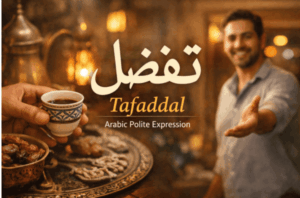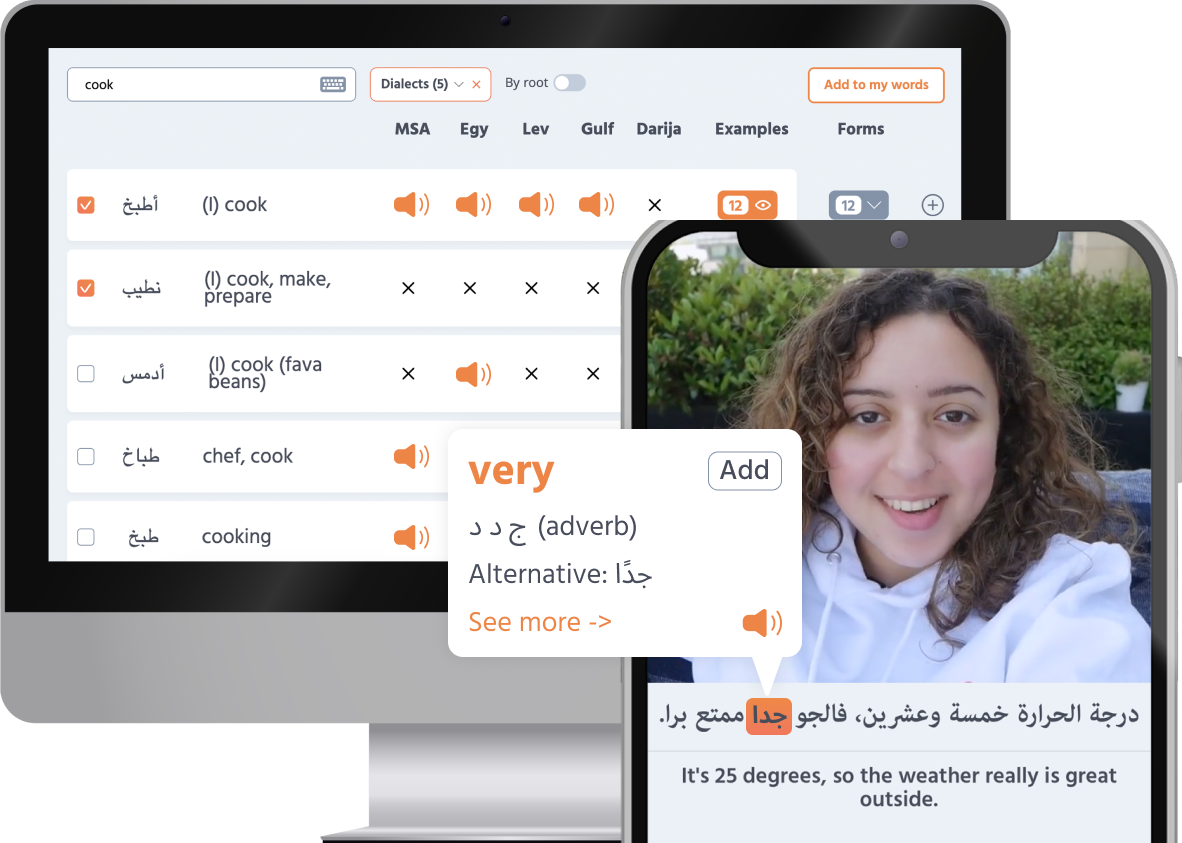Picture this: it’s Monday morning, and you’re off to your favorite café for that essential cup of coffee, with just a hint of sugar to shake off yesterday’s mild hangover from indulging in some alcohol. As you open your algebra textbook to finish off some last-minute work before class, little do you realize that words like “café,” “coffee,” “sugar,” “alcohol,” and “algebra” all have their roots deeply embedded in Arabic. Today, we’re going to delve into the fascinating Arabic influence on the English language.
Interesting facts about Arabic Arabic stands as one of the oldest languages globally and ranks fourth in terms of the number of speakers, trailing only behind Chinese, Spanish , and English. Its significance extends beyond its linguistic realm, particularly among Muslims , for whom it serves as the language of the Quran . As Islam spread to various regions, Arabic’s influence grew, with many communities adopting it for both religious and practical purposes, even in areas where it didn’t go on to become the primary language
The spread of Arabic Arabic influence on the English language is deeply rooted in centuries of cultural exchange and historical interaction.
During the Islamic Golden Age, spanning from the 8th to the 14th century, Arabic flourished as a language of scholarship, innovation, and cultural exchange.
Muslim scholars made significant advancements in mathematics, astronomy, medicine, and philosophy, producing works that profoundly shaped human knowledge. Cities like Baghdad, Cordoba, and Cairo became renowned centers of learning, attracting scholars from diverse backgrounds to study and share ideas.
Get free Arabic videos with interactive captions for your level
Get free videos
Concurrently, Europe was experiencing the Dark Ages, a period marked by political instability, economic decline, and limited intellectual pursuits.
As Islamic civilization thrived, European scholars sought knowledge from Arabic texts, leading to the translation of numerous works into Latin and vernacular languages.
This translation movement, particularly in places like Toledo, Spain, played a crucial role in preserving and transmitting ancient Greek and Roman knowledge, which had been significantly expanded by Muslim scholars.
The Crusades, beginning in the late 11th century, further facilitated the exchange of ideas between the Islamic world and Europe. Crusaders returning from the Middle East brought back not only stories and goods but also new knowledge and technologies. Arabic numerals, for example, replaced the cumbersome Roman numeral system, revolutionizing European mathematics.
Trade and commerce between Europe and the Islamic world were pivotal in this cultural exchange. The Silk Road and other trade routes enabled the flow of goods, ideas, and innovations. The Arabic influence on the English language is evident in words related to trade, such as “tariff,” “sugar,” “cotton,” and “admiral,” which entered European languages. This underscores the significant impact of Arabic on the lexicon of trade and daily life.
The rise of the Ottoman Empire in the 14th century extended the reach of Islamic culture and scholarship into Southeastern Europe. The Ottomans’ control of key trade routes between Europe and Asia ensured continued knowledge and goods exchange. European travelers, diplomats, and merchants interacting with the Ottoman Empire often brought back new concepts and vocabulary.
Colonialism and exploration in the Middle East and North Africa during the 18th and 19th centuries further integrated Arabic words and ideas into European languages. As European powers established colonies and trading posts, they adopted and adapted local terms. This period saw the introduction of Arabic words into English related to everyday life, science, and technology.
The cumulative impact of these historical interactions is evident in the modern English language. Words such as “alchemy,” “algorithm,” “algebra,” “zenith,” and “nadir” all have Arabic origins, reflecting the profound influence of Arabic scholarship on European intellectual traditions.
Thus, the Arabic influence on the English language can be traced back to this pivotal era of cross-cultural fertilization and intellectual exchange, enriched by the dynamic interactions during the Crusades, thriving trade routes, the expansion of the Ottoman Empire, and the era of colonialism and exploration in the Middle East and North Africa.
From Roman numerals to Arabic numbers One of the most influential Muslim scholars, Muhammed ibn Musa Al-Khwarizmi, left an indelible mark on the English language. His work introduced concepts like “algorithm” and “algebra,” while also popularizing the Hindu-Arabic numerals we use today, marking a significant shift from the cumbersome Roman numerals.
Arabic influence on the English language and borrowed words It’s hard to make an exact count of all the English words that were borrowed from the Arabic language. However, it is estimated that there are more than 1,000 English words that come from Arabic origins . Learning Arabic words similar to the English ones you already know is a quick and easy way to expand your vocabulary. Here’s a list of some of them:
English Word
Arabic Origin
Literal Meaning of the Arabic
Admiral
أَمِير البِحَار
Commander of the seas
Alchemy
الكِيمْيَاء
Chemistry
Alcohol
الكُحُول
Alcohol
Alcove
القُبَّة
The dome
Algebra
الجَبْر
The reunion of broken parts
Algorithm
خُوَارِزْمِيَّة
Al-Khwarizmi’s (related to the mathematician Al-Khwarizmi)
Apricot
البَرْقُوق
Apricot or plum
Arsenal
دَار الصِنَاعَة
House of manufacturing
Artichoke
الخُرْشُوف
The artichoke
Assassin
الحَشَّاشِين
A secret religious sect known for carrying out assassinations
Aubergine
بَاذِنْجَان
Eggplant
Carat
قِيرَاط
A small unit of weight equals 1/24th of the medieval Arabic gold Dinar
Candy
القَنْد
Solidified sugar cane molasses
Cipher
صِفْر
Zero/ empty or nothing
Coffee/ Cafe
قَهْوَة
Coffee from the Turkish “Kahva”
Cotton
قُطْن
Cotton
Crimson
قُرْمُزِي
Of the color crimson used to dye silk and wool in the medieval era
Elixir
الإكْسِير
The elixir, alchemical philosopher’s stone. Was believed to turn metals into gold.
Garble
غَرْبَل
To sift
Gazelle
غَزَال
Gazelle
Giraffe
زَرَافَة
Giraffe
Ghoul
غُول
Demon
Guitar
قِيثَارة
Lyre
Harem
حَرِيم
Sacred or forbidden place where the wives and female servants resided.
Hashish
حَشِيش
Weed/ grass/ herb
Henna
حِنّاء
Henna (hair dye)
Hummus
حُمُّص
Chickpeas
Ifrit
عِفْريت
Powerful or rebellious spirit
Jar
جَرَّة
Jar
Jasmine
يَاسْمِين
Jasmine
Jinn
جِنّ
Genies or spirits
Jumper
جُبَّة
Long robe
Kohl
كُحل
A type of fine powder used as eyeliner
Lemon
لَيْمُون
Lemon
Loofah
لِيف
Fibrous sponge
Lute
العُود
Lute (musical instrument)
Magazine
مَخَازِن
Storehouses
Mattress
مَطْرَح
Place where something is thrown (for sleeping)
Monsoon
مَوْسِم
Season
Mufti
مُفْتِي
Islamic legal expert
Muslim
مُسْلِم
One who submits (to God)
Mummy
مُومْيَاء
Bitumen (used in embalming)
Macabre
مَقابِر
Graves
Massage
مَسّ
To touch
Nadir
نَظِير
Opposite
Orange
نَارِنْج
Bitter orange
Ream
رِزْمَة
Bundle
Rook
رُخْ
Mythical bird or chess piece
Safari
سَفَر
Journey
Saffron
زَعْفَرَان
Saffron
Sash
شَاش
Fine muslin
Serendipity
سَرَنْدِيب
Sri Lanka
Sheikh
شَيخ
Elder or chief
Spinach
سَبَانِخ
Spinach
Sugar
سُكَّر
Sugar
Sultan
سُلْطَان
Ruler
Syrup/ Sherbet
شَرَاب
Drink
Tabla
طَبلَة
Drum
Tahini
طَحِينَة
Ground sesame
Talisman
طِلْسَم
Magic charm
Tamarind
تَمْر هِنْدِي
Indian date
Tariff
تَعْرِيفَة
Fee
Tuna
تُنّ
Tuna fish
Typhoon
طُوفَان
Water flood
Zero
صِفْر
Zero/ empty or nothing
So whether you’re enjoying a cup of coffee (learn more about the history of coffee in Egypt and Islam in this video), solving a math problem, or indulging in some delicious falafel, take a moment to appreciate how these two languages have come together to contribute to the beauty and richness that cultural exchange brings to our world.
Curious about the connections between Arabic and other languages? Then dive into our articles exploring the fascinating links between Arabic and French, Hebrew , Italian , Spanish , and Persian !
Oh, and by the way… If learning Arabic at your own pace, with fun, real-world videos sounds like your style, then Playaling could be exactly what you’re looking for!
With Playaling, you’ll dive into any major Arabic dialect or MSA. Our diverse range of videos has it all—from everyday conversations and cultural moments to music videos, TV and movie clips, influencer content, news broadcasts, and inspiring talks.
Our interactive captions let you tap any word for instant translations, context, and audio. So, real Arabic content becomes accessible with just a click. Miss something? No problem—rewind and listen as often as you need, or hover over subtitles for quick definitions.
Spot a word you want to learn? Save it to your personalized word set, or dive into curated sets for focused practice and easy review.
Interactive exercises let you dive in and practice what you’ve learned.
Need to look something up? The Audio Dictionary has you covered with clear human pronunciations and real world examples.
It’s a learning experience that keeps you engaged, bringing authentic, real-world Arabic closer to you every step of the way.
Give it a try!









